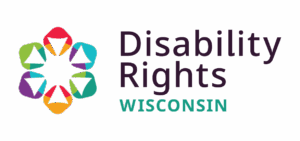Contact: Barbara Beckert, barbara.beckert@drwi.org, 414-292-2724
Voters with disabilities are historically underrepresented at the polls, and COVID-19 has created additional barriers. The Wisconsin Disability Vote Coalition is working to advance full participation of voters with disabilities and provide guidance on how to safely vote during the pandemic. Approximately 23% of the electorate will be people with disabilities, according to the American Association of People with Disabilities (AAPD).
Early voting begins in many communities today, October 20. A record number of voters with disabilities are choosing to vote early, either by mail or in person, due to concerns about COVID 19. For those who wish to vote early in-person, the Disability Vote Coalition encourages voters to wear a mask, and to check with their clerk or on MyVoteWisconsin for early voting locations and hours.
The Disability Rights Wisconsin Voter (DRW) Hotline is available to assist voters with a disability at 844-DIS-VOTE/ 844-347-8683 or info@disabilityvote.org. Voter education materials are available on the Disability Vote Coalition website at disabilityvote.org.
To ensure that our voting process is accessible to all, voters with disabilities have the right to request accommodations, including the following:
- Curbside voting is available if a voter cannot enter the polling place due to a disability. Individuals who are immunocompromised or have symptoms of COVID-19 are also eligible to curbside vote. Two poll workers will bring a ballot to the voter, and conduct voting at their vehicle, or at the polling place entrance. Proof of residence must be provided if a voter is not registered. Proof of identification must be provided.
- If a voter needs help marking the ballot, they may have a person assist them. That person does not need to be qualified to vote. The voter may bring someone with them or request assistance from a poll worker. The voter may not receive assistance from an employer or union representative.
- If a voter inside the polling location cannot sign the poll list due to a physical disability, they should inform a poll worker. The poll worker will write “Exempt by order of inspectors” in the signature space on the poll list.
- An accessible voting machine will be available at every polling place on November 3. This machine will allow voters to independently mark the ballot. These machines will be set up to allow voters who use a wheelchair to reach the controls, and have an audio ballot-marking option for voters with a visual disability. The law does not require accessible voting machines to be available at early voting locations.
- The poll worker may ask voters to speak their name and address. If a voter is unable to state their name and address, Wisconsin law allows voters to have poll workers or assistors of their choosing state their name and address on their behalf prior to receiving a ballot. Voters can also provide their information in writing to poll workers or assistors.
- Other reasonable accommodations can be requested. Speak to the chief inspector at your polling place.
A voter with a disability cannot be turned away from the polls because a poll worker thinks they are not ‘qualified’ to vote. Disability or medical diagnosis does not take away the right to vote. Only the courts can take away that right.
Reporting Concerns. If a voter experiences an accessibility or voting rights concern, it is important to report that concern so it can be resolved. Concerns should be reported to the Chief Election Inspector at the polling place or to the Municipal Clerk. We further recommend reporting the concern to the Wisconsin Elections Commission at elections.wi.gov/form/accessibility-complaint. The DRW Voter Hotline is available to help voters who have a complaint.
Voter Survey. Voters with disabilities are encouraged to take a survey to help us learn more about their voting experience. The SABE GoVoter survey is conducted nationally to learn more about what is working well for voters with disabilities and what are the challenges. The Disability Vote Coalition will use the survey results to advocate with elected officials to make improvements to our voting system.
- Link to the SABE Go Voter 2020 survey (English): https://www.surveymonkey.com/r/SABEGoVoter2020survey
- Link to Spanish (Español) survey: https://www.surveymonkey.com/r/SABEGoVoter2020surveySPA
- To request a paper survey, or schedule time for someone to assist you to complete the survey, contact the DRW Voter Hotline at 844-DIS-VOTE or email info@disabilitvote.org.

